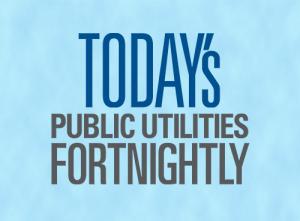PUF’s Steve Mitnick: NRECA (the National Rural Electric Cooperative Association) has some ideas on the Covid legislation that Congress is considering?

NRECA SVP Louis Finkel: As the pandemic came upon us and the health crisis began, I think we all recognize that the economic crisis came along with it. We saw record unemployment. We saw businesses negatively impacted around the country.
Electric cooperatives have really, in a lot of communities around the country, suffered as a result of that. We've seen the dual-pronged pressure of load loss, where commercial businesses are either not operating or operating at a lower frequency. Whether it's bars or restaurants, or retail establishments, but also industrial and processing plants. We've seen a lot of businesses really negatively impacted, which has brought down electric load.
Now, the other piece, we've seen a pretty significant uptick in non-payment by those folks that have been most negatively impacted. Whether those are commercial accounts, commercial member/owners of our co-ops, or individual residential member/owners of our co-ops. And those compounding pressures on not-for-profit community-owned electric cooperatives has been really difficult.
So, as we saw the economic crisis developing, we started thinking about what solutions can we find in the public policy space, and advocate to Congress that they can execute on, to provide that much-needed financial relief for our cooperatives. But, most importantly, for the most vulnerable consumers in our electric cooperative communities around the country.
Steve Mitnick: The Flexible Financing for Rural America Act?
Louis Finkel: That's one of the two priorities that we are advocating before Congress during [consideration of legislation for] Covid relief. It's really simple. Most businesses throughout the country, most individuals across the country, when they take out a loan, they have the ability to refinance that loan, especially when interest rates go down, to save money for themselves on interest payments.
Electric cooperatives that borrow money through the Department of Agriculture don't have that ability. Under law, if an electric cooperative wants to re-price their debt with the Department of Agriculture, they'd have to pay a pretty hefty pre-payment penalty to get out of that loan and move to new loan. And, as we know, the Federal Reserve cut interest rates pretty significantly earlier this year, which now has the Treasury rate at 1.2 percent.
So, the piece of legislation that we are advocating for, is to allow electric cooperatives to re-price their Department of Agriculture debt without that prepayment penalty. The reason that's so important is, at a time of significant economic strain of increased non-payment of utility bills, of loss of electric load because of decreased activity in the commercial and industrial space, we think this is a common-sense solution to allow electric cooperatives to bring down their interest rates.
Steve Mitnick: What kind of reception is this getting? Bipartisan?
Louis Finkel: We have a long history of working with Members on both sides of the aisle. That's kind of what we always do. We work with any elected official that represents cooperative communities.
The result of that is that we've got bipartisan coalitions in both the House and Senate that not only introduced, but have been supporting and advocating for enactment of this legislation. We've got a hundred and twenty-six co-sponsors in the House, and we have mid-twenties in the Senate. It's even bipartisan splits in both chambers.
Steve Mitnick: I wish we had that on everything.
Louis Finkel: That's kind of how we, as NRECA, and our electric cooperatives, approach our legislative advocacy. To work with members on both sides of the aisle, find common-sense solutions to the problems our cooperatives face, and build those bipartisan coalitions of our legislative objectives.
So we feel that we've been doing everything we can to carry the message. Our grassroots network of members around the country have been telling their members of the House and Senate that this is important and needs to get done this year. And we are going to continue to carry that message for as long as we need to until it gets to that.
Steve Mitnick: There's a second area that you're looking at, the important issue of more assistance to consumers who have trouble paying their energy bills.
Louis Finkel: We all know that the economic downturn has resulted in record unemployment, and record under-unemployment. Where folks are either unemployed or getting fewer shifts in their jobs. Household incomes are really being impacted by this.
I think that Congress needs to step in and protect the most vulnerable in our communities. This is a problem that is month-to-month. But there's also a long-term consequence of this too. Because as we come out of the pandemic, as people are getting back to work, thousands and thousands of dollars of back bills are going to need to be paid by them.
There are a couple of different programs that have been proposed by Congress that we think would be really helpful. The first is an increase in the LIHEAP program to help the most vulnerable. We think that's absolutely, without question, the right approach.
But the other program that has been proposed by the House several times has been within housing assistance programs, both mortgage assistance and rental assistance. They've allowed for those programs to not just be used to help address rent and mortgage payments, but also to cover utility bills.
And for our electric cooperatives, that's not just about the electric bills from our consumer/owners, but it's also, their broadband bill. Because electric cooperatives continue to provide broadband connectivity to these underserved communities that have never seen broadband before.
So we are hopeful that Congress will, as they continue to develop this final Covid relief package, not only allow it to re-price our RUS [Rural Utility Service] debt, but they'll provide that safety net to consumers to address this utility bill non-payment issue.

